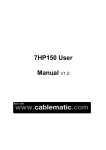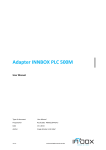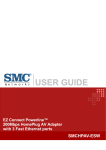Download Rosewill RPLC-500 User manual
Transcript
Premium 200Mbps Powerline AC Pass-Through AV+ Adapter RPLC-200P User Manual Premium 200Mbps Powerline AC Pass-Through AV+ Adapter - RPLC-200PKIT- User’s Manual Contents PACKAGE CONTENTS .................................................................................. 3 CHAPTER 1 INTRODUCTION TO HARDWARE ............................................ 4 1.1 EXPANDING YOUR NETWORK WITH RPLC-200P.......................................... 4 1.2 KEY FEATURES ......................................................................................... 4 1.3 APPLICATION ............................................................................................ 5 1.4 SYSTEM REQUIREMENT ............................................................................. 6 1.5 HARDWARE DIAGRAM OF RPLC-200P ....................................................... 7 1.5.1 LED .................................................................................................. 7 1.5.2 Powerline Adapter‟s Button and Connector ....................................... 8 CHAPTER 2 INTRODUCTION TO UTILITY ................................................... 9 2.1 UTILITY INSTALLATION ............................................................................... 9 2.2 UTILITY INTRODUCTION ........................................................................... 12 2.2.1 Main Tab......................................................................................... 12 2.2.2 Privacy Tab ..................................................................................... 15 2.2.3 Diagnostics Tab .............................................................................. 16 2.2.4 About Tab ....................................................................................... 18 CHAPTER 3 FORMING A POWERLINE (HOMEPLUG AV) NETWORK ..... 19 3.1 USING THE SECURITY PUSHBUTTON ......................................................... 19 3.2 USING THE UTILITY ................................................................................. 19 CHAPTER 4 JOINING A NETWORK ............................................................ 22 4.1 USING THE SECURITY PUSHBUTTON ......................................................... 22 4.2 USING THE UTILITY ................................................................................. 23 APPENDIX A: IMPROVING THE TRANSMISSION QUALITY ..................... 24 APPENDIX B: SPECIFICATIONS ................................................................. 25 APPENDIX C: ACRONYMS AND ABBREVIATIONS ................................... 27 APPENDIX D: RPLC-200P QOS SUPPORT ................................................ 28 -2- Premium 200Mbps Powerline AC Pass-Through AV+ Adapter - RPLC-200PKIT- User’s Manual Package Contents The following items should be found in your package: 2x Rosewill RPLC-200P Premium 200Mbps Powerline AC Pass-Through AV+ Adapter 2x RJ45 Ethernet Cable 1x Quick Installation Guide 1x Resource CD for RPLC-200P, including: Rosewill Powerline Utility Quick Installation Guide User Guide Note: Make sure that the package contains the above items. If any of the listed items are damaged or missing, please contact with your distributor. -3- Premium 200Mbps Powerline AC Pass-Through AV+ Adapter - RPLC-200PKIT- User’s Manual Chapter 1 Introduction to Hardware Thank you for purchasing Rosewill‟s RPLC-200P Premium 200mbps Powerline AC Pass-Through AV+ Adapter. The RPLC-200P adapter can transmit data at least 30% above regular 200mbps Powerline adapter via household‟s power outlet. RPLC-200P helps you to easy establish a high-speed network that supports HD video, voice, and data without wiring and drilling. It is suitable for using in a wide range of both residential (at home) and commercial (offices, apartments, hotels, warehouses) network applications. 1.1 Expanding your Network with RPLC-200P The RPLC-200P plugs into an power outlet to extend cable or DSL modem connection or your current Ethernet Network to almost any power outlet in your home with any new cabling.* Devices can securely communicate with each other via the 128-bit Advanced Encryption Standard (AES) through RPLC-200P at a high speed transfer rate of 200Mbps and at 10/100mbps LAN support. Note: Powerline Technology has certain limitations. 1. To ensure the best performance for Powerline Data transmission, we recommended to use under one power circuit and without uses via power strip or extension block. 2. Performance may be decreased under different circuits but within one Electricity Meter due to the drop-off via hardware. 1.2 Key Features 500Mbps Peak PHY Rate RPLC-200KIT provides sufficient bandwidth to fulfill demanding applications such as online gaming and HD media streaming, and etc. Built-in Noise filter can help to reduce power interference and enhances data transmission quality. Plug and Play with Quick and Easy Installation Installation requires no new wiring Every power socket becomes a connection node in the household. RPLC-200P supports connection for a total of 16 nodes. -4- Premium 200Mbps Powerline AC Pass-Through AV+ Adapter - RPLC-200PKIT- User’s Manual Plug-and-play to your routers, computers and other network devices. Enjoy Stable HD Videos and Gaming With a pair of plug-and-play RPLC-200P installed, you can easily extend your home network through any electrical outlet for Internet access by HDTVs, Blu-ray™ players, DVRs, PCs and game consoles. QoS Management Enhances Streaming Quality RPLC-200P supports a fixed 4-level type QoS and 8-level VLAN priority fields which automatically improves the streaming quality Green Feature for Power saving mode RPLC-200P will detect signals when there is no signal transmit, it will automatically enters Power Saving mode which saves near 80% of the energy consumption. Extra Power Outlet for more Convenience RPLC-200P enables users to access both network connection and power supply to multiple electrical devices with AC pass-through design. You can easily access to internet via powerline without sacrifice your current power outlets. 1.3 Application Shared broadband internet access Higher data rate broadband sharing for power line LAN Backbone for Wireless and Wireless Extender TV over IP (IPTV) and Voice over Internet Protocol (VoIP) High Definition (HD) and Standard Definition (SD) video distribution Video surveillance Online Gaming -5- Premium 200Mbps Powerline AC Pass-Through AV+ Adapter - RPLC-200PKIT- User’s Manual 1.4 System Requirement If need to use Powerline Utility: Operating system: Windows 98SE, 2000, ME, XP 32/64 bit, Vista 32/64bit, and Win7 32/64 bit otherwise, no OS require CPU: Intel Pentium III or better, clock rate faster than 2.0GHz recommended RAM: At least 128MB Screen resolution: Any resolution Free disk space: At least 20MB Network interface: At least one Fast Ethernet (100 Mbps) network card, and a Ethernet Cable. -6- Premium 200Mbps Powerline AC Pass-Through AV+ Adapter - RPLC-200PKIT- User’s Manual 1.5 Hardware Diagram of RPLC-200P 1.5.1 LED LED Color Behavior Description Green On System runs normally. Green Blink System is resetting. System is in the process of (Power) password synchronization. System is in Power Saving mode -7- Premium 200Mbps Powerline AC Pass-Through AV+ Adapter - RPLC-200PKIT- User’s Manual - Off The PLC adapter is powered off. Green On Ethernet connection has established. Blink Data is being transmitted. Off No Ethernet connection. On The PLC adapter has connected to the powerline network. The Data LED color may vary according to the Data Transmit Quality. (Ethernet) Green/Orange/Red (Data) Green: Data Transmit Quality Excellent Orange: Data Transmit Quality Average Red: Data Transmit Quality Poor - Off The PLC adapter does not connect to the powerline network. 1.5.2 Powerline Adapter’s Button and Connector Reset/Security: Reset: Pressing and holding the Button for between 10 seconds and 15 seconds makes the adapter restore the factory default settings. Security: Pressing and holding the button for less than 3 seconds makes the adapter a member of the existing Powerline Network. Ethernet Port (RJ45 Port): The Ethernet port connects to an Ethernet network cable. The other end of the cable connects to your computer or other Ethernet-enabled network device. Connecting to the router/modem: Insert One end of the RJ45 Cable (Recommend using Cat 5E cable or above for Gigabit Network environment) to this port, and the other end to the router or modem. Then plug into the electrical outlet. Connecting to PC / Smart TV / NB / Blu-ray Player / Media Player / IP Phone: Insert One end of the RJ45 Cable (Recommend using Cat 5E cable or above) to this port, and the other end to the other devices. Then plug into the electrical outlet. -8- Premium 200Mbps Powerline AC Pass-Through AV+ Adapter - RPLC-200PKIT- User’s Manual Chapter 2 Introduction to Utility Note: Before installing the PLC utility software, make sure that there is no any other powerline utility installed on your computer. If there is another utility installed, please uninstall it and restart your computer. 2.1 Utility Installation Please follow the steps below to install the utility. 1. Please insert the utility CD into the computer‟s CD-ROM drive. Select the Utility Installation from the Wizard Page. 2. The window for installing the utility software will display. Click Next to continue. -9- Premium 200Mbps Powerline AC Pass-Through AV+ Adapter - RPLC-200PKIT- User’s Manual 3. Select I Agree, and then Next to continue. 4. You can choose your own destination folder to install or click Browse… to select the installation folder, and then click Next to continue.. -10- Premium 200Mbps Powerline AC Pass-Through AV+ Adapter - RPLC-200PKIT- User’s Manual 5. You can choose your own destination folder to install or click Browse… to select the installation folder, and then click Next to continue. -11- Premium 200Mbps Powerline AC Pass-Through AV+ Adapter - RPLC-200PKIT- User’s Manual 2.2 Utility Introduction Click the desktop icon below to enter the configuration page. 2.2.1 Main Tab The Main screen provides a list of all powerline devices logically connected to the computer when the utility is running. The top panel shows the local HomePlugAV devices connected to the network interface card (NIC) of the computer. Click Connect. The utility automatically scans the powerline periodically for other HomePlugAV devices connected to it. If no local HomePlugAV device is discovered, the status bar displays NO HOMEPLUG ADAPTERS DETECTED. The lower panel displays all the HomePlugAV remote devices, which are discovered in the current logical network. The total number of remote devices connected in the -12- Premium 200Mbps Powerline AC Pass-Through AV+ Adapter - RPLC-200PKIT- User’s Manual same network is displayed above the remote device panel. Network type (Public or Private) depends on the network status of the local device. Autoscan shows whether the autoscan function is on. The following information is displayed for all the devices that appear in the lower panel. Device Name This column shows the default device name, which may be modified. To change the name, click Rename, or click the name and edit it in the list. MAC Address This column shows the MAC addresses of the remote devices. Password By default, this column is blank. You can click Enter Password to change it. The steps for setting the password of the device (required when creating a private network) are as follows: Click the device name to select the device in the lower panel. Click Enter Password. A dialog box appears, showing the device name and password. 錯誤! 找不到參照來源。 Click OK to verify the password. The password field accepts the device password in any case formats, with or without dash. -13- Premium 200Mbps Powerline AC Pass-Through AV+ Adapter - RPLC-200PKIT- User’s Manual A confirmation box appears if the password is entered correctly. If a device is not found, a message appears, providing suggestions to solve the common problems. This process might take a few seconds to get completed. Add This button is used to add a remote device to the existing network by entering the device password of the device. A dialog box will appears. You can enter a device name and the password. (Also refers as DEK on the back Label, this DEK is generates via MAC address) If the device is found and the password is entered correctly, a confirmation box appears. If a device is not found, a message appears, providing suggestions to solve the common problems. Note: The device must be in the powerline (plugged in), so that you can confirm the password and add the device to the network. If the device is not located, a warning message appears. Scan This button is used to perform an immediate search for HomePlugAV devices connected to the powerline network. By default, the utility automatically scans -14- Premium 200Mbps Powerline AC Pass-Through AV+ Adapter - RPLC-200PKIT- User’s Manual every a few seconds and updates the displayed information. 2.2.2 Privacy Tab In the Privacy screen, you can maintain security for the logical network and select the device included in the network. All HomePlugAV devices are loaded using a default logical network (network name), which is normally “HomePlugAV”. In the Privacy screen, you can modify a private network by changing the network names and the passwords of the devices. You can always reset to the HomePlugAV network (Public) by entering “HomePlugAV” as the network name or by clicking on the Use Default button. Note: If the network name changes to anything other than HomePlugAV, the network type in the main screen is displayed as Private. Set Local Device Only This button is used to change the network name and password of the local device. If a new network password is entered, all the devices appeared in the main panel prior to this are no longer present in the new network, effectively -15- Premium 200Mbps Powerline AC Pass-Through AV+ Adapter - RPLC-200PKIT- User’s Manual making the local devices not to communicate to the devices which are in the old logical network. Click Set Local Device Only, the devices previously set up with the same logical network (same network name) appears in the device list. Set All Devices This button is used to change the logical network of all devices that appear in the main panel. If these devices whose passwords have been entered for the same logical network, a dialog box appears, indicating the success of this operation. For the devices whose passwords are not entered, this operation will fail and it will report a failure message. 2.2.3 Diagnostics Tab The Diagnostics screen shows the system information and history of all remote devices appeared over a period of time. The Upper panel shows technical data concerning software and hardware on the host computer that are used to communicate through HomePlug on the powerline network. It includes the following: Operating system platform/version Host network name User name MAC address of all NICs (Network interface card) connected to the host Identify versions of all driver DLLs and libraries used (NDIS) and optionally HomePlug chipset manufacturer name (Turbo Only devices) MAC firmware version (Turbo Only devices) MAC addresses of all devices connected locally to the host Version of the configuration utility Vendor name -16- Premium 200Mbps Powerline AC Pass-Through AV+ Adapter - RPLC-200PKIT- User’s Manual The Lower panel displays the history of all remote devices appeared on the computer over a certain period of time. All the devices and the parameters of the devices on the powerline network are listed. Devices that are active on the current logical network show a transfer rate in the rate column. Devices on other networks, or devices that no longer exist are shown with a “?” in the rate column. The following remote device information is available from the diagnostics screen: Device alias name MAC address Password Device last known rate Device last known network name HomePlug chipset manufacturer name Date device last seen on the network MAC firmware version The diagnostics information displayed can be saved to a text file for later use, or be printed for reference for a technical support call. Click Delete to delete the devices which are no longer part of the network. A dialog window pops up with a confirmation -17- Premium 200Mbps Powerline AC Pass-Through AV+ Adapter - RPLC-200PKIT- User’s Manual message if the user wants to delete a device whose password has been entered. 2.2.4 About Tab The About screen shows the software version and provides a html link to a website, such as http://www.qua.qualcomm.com. Clicking the web address, you can visit the web site. -18- Premium 200Mbps Powerline AC Pass-Through AV+ Adapter - RPLC-200PKIT- User’s Manual Chapter 3 Forming a Powerline Network This chapter describes how to form a HomePlug AV logical network (AVLN) using the Security pushbutton and using the Utility. Operation progress and outcome can be monitored by observing the behavior of the power LED. 3.1 Using the Security Pushbutton Scenario: Devices A and B with different NMK (Network Membership Key used to authenticate/access) values are connected to the same powerline. Users want to use them to form a logical network. Forming a HomePlug AV logical network Please follow below steps to form a logical network using the Security button: 1. Press the Security button on Device A for less than 3 seconds. 2. Press the Security button on Device B for less than 3 seconds. The button on B must be pressed within 2 minutes 3. Wait for connection to complete. The Power indicator on both devices will flash evenly at 1 second interval until the operation succeeds or fails. The Power indicator will illuminate steadily on successful completion. If an error occurs, the Power indicator on both devices will flash unevenly for 2 minutes. 3.2 Using the Utility Scenario: -19- Premium 200Mbps Powerline AC Pass-Through AV+ Adapter - RPLC-200PKIT- User’s Manual Devices A and B are located in different networks. Users want to use them to form a logical network. In this case, using the Security pushbutton cannot pair Devices A and B. Users can only use the Utility to form a logical network. Please follow below to form a logical network using the Utility: 1. Connect Device A to the network card of a PC. 2. Open the Utility. The Main tab page displays information about Device A after connection succeeds. Search for Local device on your computer 3. Click the Privacy tab page. Enter a name in the Private Network Name field. Setting the network name for your PLC 4. Click Set Local Device Only. When the following page is displayed, the setting succeeds. Now Device A has been removed from its logical network. -20- Premium 200Mbps Powerline AC Pass-Through AV+ Adapter - RPLC-200PKIT- User’s Manual Network name setting success 5. Repeat the procedures above to configure Device B. Configure Device B with the same Private Network Name as Device A. After the operation success, Devices A and B form a new logical network. -21- Premium 200Mbps Powerline AC Pass-Through AV+ Adapter - RPLC-200PKIT- User’s Manual Chapter 4 Joining a Network This chapter describes how to add a device to an existing HomePlug AV logical network (AVLN) using the Security/Reset pushbutton and using the Utility. Operation progress and outcome can be monitored by observing the behavior of the power LED. 4.1 Using the Security Pushbutton Scenario: Devices A and B are located in network N. Device C (the joiner) that is not located in any networks attempts to join Network N. Any devices on Network N can become the „adder‟. Joining a network Please follow below to add Device C to Network N using the Security button: 1. Press the Security button on Device A (or Device B) for less than 3 seconds, making it the „adder‟. 2. Within 2 minutes, press the Security button Device C (the „joiner‟) for less than 3 seconds. 3. Wait for connection to complete. The Power indicator on Device A (or Device B) and Device C will flash at 1 second intervals until the process succeeds or fails. It will illuminate steadily on success. If an error occurs, the Power indicator on Device A (or Device B) and Device C will flash unevenly for 2 minutes. -22- Premium 200Mbps Powerline AC Pass-Through AV+ Adapter - RPLC-200PKIT- User’s Manual 4.2 Using the Utility Scenario: Devices A and B are located in Network N. Device C (the joiner) that is located in another network attempts to join Network N. See Do as follows to add Device C to Network N using the Utility: 1. Connect Device C to the network card of a PC. 2. Open the Utility. The Main tab page displays information about Device C after connection succeeds. 3. Click the Privacy tab page. Enter a name in the Private Network Name field. 4. Click Set Local Device Only. When the page shown as below displayed, the setting success. Now Device C has been removed from its logical network. 5. Press the pushbutton on Device A or B for less than 3 seconds, making it the „adder‟. 6. Within 2 minutes, press the pushbutton on Device C (the „joiner‟) for less than 3 seconds. 7. Wait for connection to complete. The Power indicator on Device A (or Device B) and Device C will flash at 1 second intervals until the process succeeds or fails. It will illuminate steadily on success. If an error occurs, the Power indicator on Device A (or Device B) and Device C will flash unevenly for 2 minutes. -23- Premium 200Mbps Powerline AC Pass-Through AV+ Adapter - RPLC-200PKIT- User’s Manual Appendix A: Improving the Transmission Quality It is important to use the PLC product complying with the following "rule of thumb", because it can significantly improve the transmission capacity of the network. PLC device is recommended to plug the device directly into a wall socket, not to power stripe. -24- Premium 200Mbps Powerline AC Pass-Through AV+ Adapter - RPLC-200PKIT- User’s Manual Appendix B: Specifications Specification Standards IEEE 1901 and HomePlug AV compliant Co-existence with HomePlug 1.0 Nodes IEEE802.3, IEEE802.3u Encryption 128-bit AES Encryption Ports 10/100Mbps Ethernet port LEDs Power, Ethernet, Data Powerline Speeds Up to 200Mbps, Peak PHY Rate 500Mbps Powerline Range Up to 984 ft over Electricity line (300M) Maximum PLC support Capable of extending up to total of 8 Powerline adapters in one environment Connection Type RJ45 Connection Speeds 10/100M Kit Type Double Frequency Band 2 MHz ~ 28 MHz Power Consumption - <2.7W Operation - 1.6W Idle - 0.34W Standby (enter standby mode after 30 mins without data transmit detected) Outlet Current 220VAC 16A Maximum, 110VAC 20A Maximum QoS Support - Built-in Fixed Quality of Service (QoS) enhances VoIP, media, and Data streaming quality: - QoS Priority (Fixed): - 1st: Network Management Frames and Voice - 2nd: HD Video and Music Streaming - 3rd: Data Streaming System Requirement Deployment requirements: -25- Premium 200Mbps Powerline AC Pass-Through AV+ Adapter - RPLC-200PKIT- User’s Manual - Devices with 10/100 or 10/100/1000 Mbps Ethernet port - Operates system not require for uses without Utility - Utility software OS support: - Microsoft Windows 2000/XP/Vista/7 Dimensions 4.61 x 2.36 x 2.09in (117 x 60 x 53 mm) (1 Powerline adapter) Weight 0.41 lb (180 g) (1 Powerline adapter) Temperature 0°C~40°C Operation -20°C~70°C Storage Humidity 10%~90% (non-condensing) Operation 5%~90% (non-condensing) Storage Contents 2x RPLC-200P Premium 200Mbps Powerline AC Pass-through AV+ Adapters 1x Quick Installation Guide 1x User Manual / Utility CD 2x RJ45 Ethernet Cables -26- Premium 200Mbps Powerline AC Pass-Through AV+ Adapter - RPLC-200PKIT- User’s Manual Appendix C: Acronyms and Abbreviations AVLN AV In-home Logical Network, the AVLAN is the set of STAs that possess the same network membership key. Every AVLN is managed by a single CCo. CCo Central Coordinator CSMA/CA Carrier Sense Multiple Access / Collision Avoidance DAK Device Access Key DM Device Manager IGMP Internet Group Management Protocol NEK Network Encryption Key NID Network ID (Identification) NMK Network Membership Key PLC Powerline Communication PIB Parameter Information Block STA Station, a STA in the network with a connection to the powerline and being able to source or sink traffic TDMA Time Division Multiple Access TEI Terminal Equipment Identifier TOS Type Of Service VLAN Virtual Local Area Network -27- Premium 200Mbps Powerline AC Pass-Through AV+ Adapter - RPLC-200PKIT- User’s Manual Appendix D: RPLC-200P QoS Support RPLC-200P allows for 4 levels of Channel Access Priority (CAP (0 – 3)). The 8 levels of VLAN Ethernet tags must be mapped to the 4 levels of CAP priority, where CAP 3 is the highest priority and CAP 0 is the lowest. CAP 3 priority might be used for voice and network management frames, and CAP 2 is used for streaming HD video and music while CAP 1 and CAP 0 are used for data. Default CAP The „Default CAP‟ group allows for default priority mapping of packets that do not have a VLAN TAG. The settings are available for Unicast (directed to a host). Unicast - (default CAP 1) - sets the default channel access priority for unicast frames not matching any other classification or mapping. IGMP managed Multicast Stream (Fixed to CAP 2) - sets the default channel access priority for stream data belonging to a snooped IGMP multicast group. IGMP - (default CAP 3) - sets the channel access priority for IGMP frames these are the group management frames, not the stream data. Multicast/Broadcast - sets the default CAP for multicast frames not in a snooped group and for broadcast frames. The following are the factory fixed settings for QoS Priority: 1st: Network Management Frames and Voice 2nd: Video and Music Streaming 3rd: Data Streaming Thank you for purchasing a quality Rosewill Product. Please register your product at: www.rosewill.com for complete warranty information and future support for your product. Rosewill Customer Service Hotline: 1-800-575-9885 Rosewill Customer Service Support: [email protected] -28- Premium 200Mbps Powerline AC Pass-Through AV+ Adapter - RPLC-200PKIT- User’s Manual COPYRIGHT & TRADEMARKS Specifications are subject to change without notice. is a registered trademark of Rosewill Inc. Other brands and product names are trademarks or registered trademarks of their respective holders. No part of the specifications may be reproduced in any form or by any means or used to make any derivative such as translation, transformation, or adaptation without permission from Rosewill Inc. Copyright © 2010 Rosewill Inc. All rights reserved. http://www.rosewill.com Safety Warning This device is intended for connection to the AC powerline. For installation instructions, please refer to the installation section of this guide. The following precautions should be taken when using this product. Read all instructions before installing and operating this product. Follow all warnings and instructions marked on the product. Unplug the device from the wall outlet before cleaning. Use a damp cloth for cleaning. Do not use liquid cleaners or aerosol cleaners. Do not operate this product near water. This product should never be placed near or over a radiator or heat register. Do not use an extension cord between the device and the AC power source. Only a qualified technician should service this product. Opening or removing covers may result in exposure to dangerous voltage points or other risks. Do not plug the device into a power strip or surge protector because these devices may consist of filter and impair signal. Avoid plugging the device right next to noisy sources such as cell phone charger, Halogen light, noisy desktop computer, vacuum cleaner, etc. These cases result in poor transmission speed. Unplug the device from the wall outlet and refer the product to qualified service personnel for the following conditions: If liquid has been spilled into the product If the product has been exposed to rain or water If the product does not operate normally when the operating instructions are followed If the product exhibits a distinct change in performance -29- Premium 200Mbps Powerline AC Pass-Through AV+ Adapter - RPLC-200PKIT- User’s Manual Federal Communication Commission (FCC) Interference Statement The device complies with Part 15 of FCC rules. Operation is subject to the following two conditions: This device may not cause harmful interference This device must accept any interference received, including interference that may cause undesired operations. The device has been tested and found to comply with the limits for a Class B digital device pursuant to Part 15 of the FCC Rules. These limits are designed to provide reasonable protection against harmful interference in a residential installation. This device generates, uses, and can radiate radio frequency energy, and if not installed and used in accordance with the instruction, may cause harmful interference to radio communications. However, there is no guarantee that interference will not occur in a particular installation. If this device does cause harmful interference to radio/television reception, which can be determined by turning the device off and on, the user is encouraged to try to correct the interference by on or more of the following measures: 1. Reorient or relocate the receiving antenna. 2. Increase the separation between the equipment and receiver. 3. Connect the equipment into an outlet on a circuit different from that to which the receiver is connected. 4. Consult the dealer or an experienced radio/TV technician for help. Notices Changes or modifications not expressly approved by the party responsible for compliance could void the user‟s authority to operate the equipment. CE Mark Warning This is a class B product. In a domestic environment, this product may cause radio interference, in which case the user may be required to take adequate measures. Your product is marked with this symbol, which is known as the WEEE mark. WEEE stands for Waste Electronics and Electrical Equipment. It means that used electrical and electronic products should not be mixed with general waste. Used electrical and electronic equipment should be treated separately. -30-








































